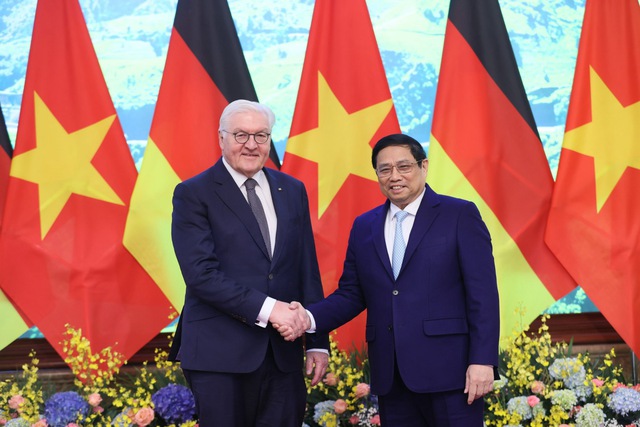Prime Minister urges Germany to soon ratify EVIPA
VGP – Prime Minister Pham Minh Chinh urged Germany to soon ratify the EU-Viet Nam Investment Protection Agreement (EVFTA) during his meeting with German President Frank - Walter Steinmeier in Ha Noi on Wednesday.

Prime Minister Pham Minh Chinh (right) meets with German President Frank - Walter Steinmeier in Ha Noi, January 24, 2024. Photo: VGP
Welcoming Steinmeier to Ha Noi, Pham assured that Viet Nam always highly values Germany's role and position in the region and the world, and expects to further deepen cooperation in all fields with Germany.
Pham expressed thanks for the German Government's donation of Covid-19 vaccines to help Viet Nam push back the pandemic and revive the economy.
He briefed the German President about Viet Nam's recent achievements in socio-economic development and international integration as well as the country's current top priorities, including infrastructure development, human resource training, growth model transformation, digital transformation, green growth, circular economy, innovation, and its responsible climate commitment.
President Steinmeier expressed his pleasure to visit Viet Nam and spoke highly of the Southeast Asian nation's dynamic development over the past years.
Both sides agreed to step up delegation exchanges, especially high-level delegations to strengthen political trust and mutual understanding to create impetus for bilateral cooperation.
The two leaders pledged to continue coordination and mutual support at multilateral forums such as the United Nations and cooperation frameworks like ASEAN- Germany and ASEAN - EU.
They agreed to encourage German businesses to invest in the areas of Germany's strength like energy, railway development, medical equipment, pharmacy, and infrastructure development.
Pham suggested Germany continue collaboration with Viet Nam to effectively implement the Just Energy Transition Partnership (JETP) in a bid to help Viet Nam realize its net-zero emissions by 2050.
The pair agreed to collaborate in formulating mechanisms and frameworks to advance vocational training cooperation. President Steinmeier said Vietnamese workers have opportunities to work in Germany to offset labor shortage in the European country.
Regarding regional and international issues of shared concern, Prime Minister Pham and President Steinmeier stressed on the necessity to maintain peace and stability, and settle disputes via peaceful means in accordance with international law.
Both sides voiced support for freedom of navigation and aviation in the East Sea on the basis of international law and the 1982 UN Convention on the Law of the Sea./.
